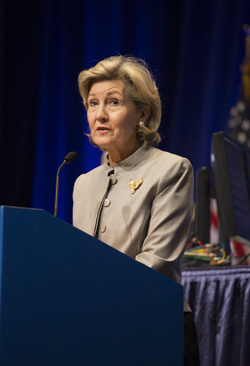Arab Spring brings no thaw for women's rights

Former U.S. Sen. Kay Bailey Hutchison courtesy of ABA Media Services.
The overthrow of several regimes in the Middle East over the past two years hasn’t produced much progress toward achieving equality for women, according to former U.S. Sen. Kay Bailey Hutchison.
And if women and girls in the region do not gain basic rights, Hutchison told lawyers gathered for the midyear meeting, it’s unlikely that the rule of law will take hold in the Middle East and North Africa.
Despite initial thoughts that the Arab Spring uprisings would bring democracy and a strong commitment to the rule of law to some countries in the region, “vocal groups that oppose equality are gaining influence,” said Hutchison, who returned to private life in January after representing Texas in the U.S. Senate for 20 years. “Voices of moderation are vital to assuring that equality will be there.”
Hutchison recently became senior counsel in the Dallas office of Bracewell & Giuliani. She was the keynote speaker at a daylong program titled “The Arab Spring: Doing Business and the Rule of Law.” The program was co-sponsored by the ABA Section of International Law and the Dedman School of Law at Southern Methodist University, which hosted the event.
Focusing on Egypt and Tunisia as examples of trends in the region following the Arab Spring uprisings that began in late 2010, she noted the current regime in Egypt has retained many of the policies and constitutional measures limiting civil rights prominent during the presidency of Hosni Mubarak.
“It is an incredible injustice in Egypt that women have been essentially cut out of the political process after playing such a vital role in the overthrow of Mubarak,” Hutchison said. Women have made more progress in Tunisia since its Arab Spring transition, she said, “but warning signs are still warranted.”
One of the keys to creating a more responsive government and legal structure that recognizes the rule of law is protection of human rights, “and that must include women and girls, including the education of girls,” Hutchison said. Many Islamic countries restrict girls from getting the same access to school as boys. “There is no such thing as a First World country that doesn’t have gender equality,” she said.
Hutchison singled out Turkey as an example of how a Muslim nation can build an effective democratic structure. And she suggested the U.S. government should tie its financial support to efforts by recipient countries to reduce oppression of women.



